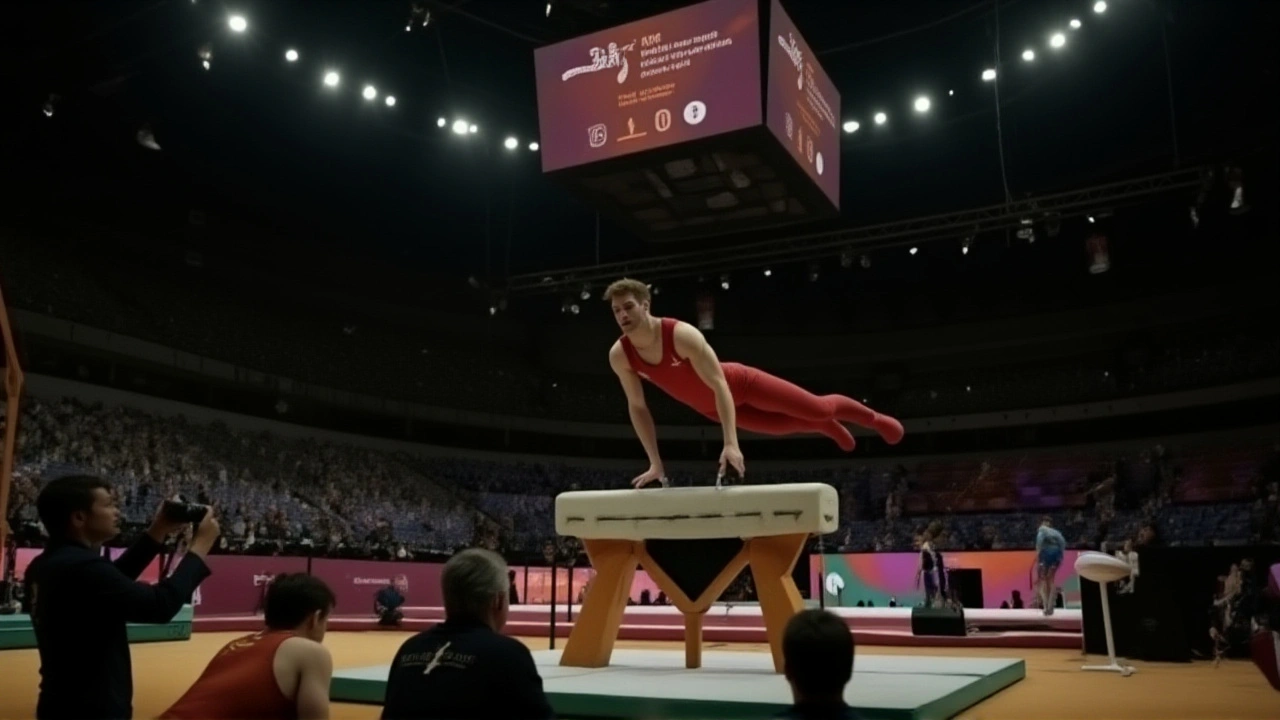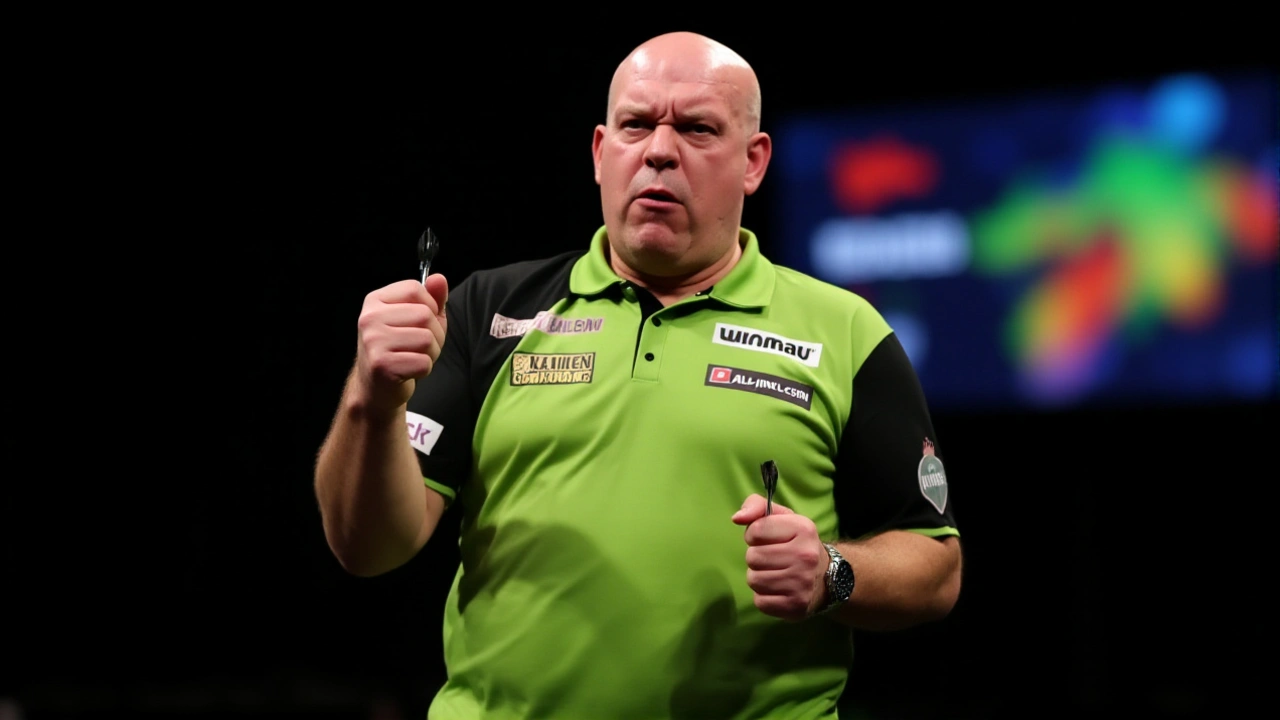When Jimme Nordkamp, Member of Parliament for the Labour–Green alliance took to the floor of the Dutch House of Representatives in early November, he didn’t just champion a niche pastime – he launched the boldest political push yet for the sport of darts to join the Olympic programme.
The appeal, lodged on 3 November 2025, was directed at the International Olympic Committee (IOC) in Lausanne. Nordkamp argued that the global reach, televisual appeal and growing youth participation make darts a natural fit for the Games, and he urged the IOC to open formal talks within the next two years.
He wasn’t speaking in a vacuum. Just a month earlier, at the Polish Darts Masters in Warsaw, three‑time PDC World Champion Michael van Gerwen was asked whether he could picture the sport under the Olympic rings. "I see a lot of potential," the Dutch star said, noting that the exposure could bring fresh sponsors and inspire a new generation, even if logistics would need a rethink.
Background: Darts and the Olympic Dream
Darts has been flirting with Olympic recognition for decades. The game’s roots lie in English pubs, but the modern professional circuit is a high‑tech, multi‑million‑viewer spectacle. Major finals in the UK routinely pull in more than 4 million TV viewers, and the sport now boasts a footprint in over 100 countries.
Still, the IOC’s rulebook is unforgiving: an Olympic sport must be governed by a single, globally recognized federation. Today, darts is split among several bodies – the Professional Darts Corporation (PDC), the World Darts Federation (WDF), the International Dart Federation (IDF), plus regional leagues such as the American Darts Organization and the European Darts Union.
On 20 September 2025, the WDF and IDF signed a "historical partnership agreement" that insiders claim could be a first step toward the unification the IOC demands. The terms remain under wraps, but the move was hailed as a signal that the sport’s leadership is finally willing to put politics aside for a common goal.
The Parliamentary Push
Nordkamp’s motion carried three key arguments. First, darts already meets the IOC’s popularity metric – the sport’s digital audience outstrips many current Olympic events. Second, the partnership between WDF and IDF shows a willingness to consolidate governance. Third, the International Mind Sports Association (IMSA), which enjoys observer status with the IOC, lists darts as a “mind sport” and has pledged to champion its inclusion.
In his statement, Nordkamp quoted a senior IMSA official: “Our goal is to see mind sports like darts, bridge and chess share the Olympic stage, uniting athletes under a common banner of skill and concentration.” The Dutch MP added that the Netherlands, which has produced multiple world champions, would gladly host a demonstration tournament during the 2028 Los Angeles Games as a proof of concept.
Governance Maze: Why Inclusion Is Tricky
The biggest hurdle isn’t talent – it’s the fragmented rulebook. The PDC runs the professional circuit, offering prize money in the millions and a glamorised broadcast package. By contrast, the WDF focuses on grassroots and amateur competitions, which the IOC would likely prefer for an Olympic format.
- Single federation requirement – The IOC wants one body to set rules, anti‑doping standards and qualification pathways.
- Commercial interests – The PDC’s lucrative TV deals could clash with the IOC’s non‑profit ethos.
- Image concerns – Decades of association with pub culture, alcohol and cigarette sponsorship still linger in the public mind.
Experts from Sporting Life, writing on 22 October 2025, warned that “the structural problem is not about competitive level; it’s about who gets to speak for the sport.” They pointed to the Junior Darts Corporation (JDC) and Amateur Darts Circuits (ADC) as more nimble, youth‑focused entities that could serve as the IOC‑friendly face of darts.
Industry Voices and Public Perception
Beyond politicians, players and administrators have weighed in. Gary Anderson, Scotland’s two‑time world champion, told a British newspaper that an Olympic presence could "legitimize the sport in the eyes of schools and sponsors" but cautioned that it might force a shift away from the high‑stakes, prize‑driven format that currently draws the biggest crowds.
Meanwhile, market analysts note that darts’ viewership spikes during major finals – the 2024 PDC World Championship final attracted a 5.2 million‑strong TV audience in the UK alone, with streaming numbers pushing the total to nearly 8 million globally. If the sport were to appear on the Olympic stage, those figures could balloon, bringing in new advertising revenue and perhaps prompting a re‑branding away from its “pub sport” origins.

What Could Change? Paths Forward
Three plausible routes could clear the way for Olympic darts:
- Federation merger – If the PDC, WDF and IDF agree to form a single International Darts Federation, the IOC’s core requirement would be met.
- IMSA umbrella – Leveraging the IMSA framework, darts could be presented as a mind sport, with the IDF acting as the official Olympic liaison.
- Grassroots showcase – The JDC and ADC could organise a mixed‑gender, mixed‑age tournament in a host city, proving that darts can thrive under Olympic‑style competition.
Any of these scenarios would need to address the lingering stigma. Sponsors are already moving away from alcohol branding – the PDC’s recent partnership with a major tech firm shows that the sport can attract clean‑image partners.
As the next Olympic cycle approaches, the pressure will mount on darts’ governing bodies to present a united front. If the WDF‑IDF agreement materialises into a concrete governance model, the IOC could well schedule a trial event for the 2028 Games.
Key Takeaways
- Darts enjoys massive TV audiences and a growing global player base.
- The sport’s fragmented governance remains the primary roadblock to Olympic inclusion.
- Political advocacy, led by Dutch MP Jimme Nordkamp, is putting the issue on the IOC’s radar.
- A unified international federation or a successful IMSA partnership could satisfy IOC criteria.
- Public perception is shifting; clean‑image sponsors are emerging, easing the “pub sport” stereotype.
Frequently Asked Questions
How would Olympic darts differ from the current professional circuit?
Olympic darts would likely focus on amateur and emerging talent, using a format overseen by the World Darts Federation or a unified body. While the PDC’s prize‑money‑heavy tournaments would stay intact, the Games would showcase shorter matches and mixed‑gender events to fit the Olympic schedule.
What role does the International Mind Sports Association play in the Olympic push?
IMSA, as an observer of the IOC, promotes mind‑based games, including darts through its IDF observer membership. Its endorsement could allow darts to be presented as a mind sport, sidestepping some of the commercial concerns tied to the PDC.
Why has governance been such a stumbling block for darts?
The IOC mandates a single international federation to ensure consistent rules, anti‑doping compliance, and fair qualification pathways. Darts currently operates under multiple bodies – the PDC, WDF, IDF and various regional leagues – creating ambiguity about who would represent the sport at the Olympic level.
Which countries stand to benefit most if darts joins the Olympics?
Nations with strong amateur programs, like the Netherlands, England, and Australia, could see a boost in funding and youth participation. Smaller darts nations would gain visibility on a global stage, potentially accelerating development of local leagues.
What is the timeline for a possible Olympic debut?
If the WDF‑IDF partnership leads to a unified federation by early 2026, the IOC could schedule a trial event for the 2028 Los Angeles Games. Otherwise, the next realistic window would be the 2032 Brisbane Olympics, once the governance issue is fully resolved.


Mark Langdon
October 24, 2025 AT 19:31I get why folks are pumped about darts going Olympic. The viewership numbers are insane and the sport’s digital audience outstrips many current events. A unified federation could finally give it the legitimacy the IOC wants. The Dutch MP’s push is a bold political move that might just tip the scales. If they can sort out the governance maze, we could see darts on the world stage.
Ciara Russell-Baker
November 6, 2025 AT 12:04lol darts in the Olympics? whaaat.
Aaron Samarita
November 19, 2025 AT 05:37The proposal to insert darts into the Olympic programme is a textbook case of political grandstanding. Legislators across Europe love to latch onto niche sports that promise easy media coverage. This is not a grassroots movement; it is a top‑down maneuver designed to curry favor with sponsors. The International Olympic Committee has long struggled with governance issues, and darts merely adds another layer of complexity. The fractured nature of the sport’s federations-PDC, WDF, IDF-means there is no single authority to speak for athletes. The IOC’s single‑federation rule exists precisely to avoid the bureaucratic chaos that darts now exemplifies. Moreover, the commercial ties of the PDC to betting companies raise serious ethical concerns. Introducing darts could open the floodgates for gambling sponsorships to infiltrate an otherwise apolitical event. This would undermine the Olympic ideals of fairness and purity that the Games historically champion. While viewership figures are impressive, they are driven by spectacle, not sport. The “mind‑sport” argument is a convenient loophole to sidestep concerns about alcohol and pub culture. The fact that the Dutch MP is pushing this agenda reflects a broader trend of politicians exploiting sports for soft power. If the IOC were to approve darts, it would set a precedent for other fringe activities to demand inclusion. The sport would likely have to sacrifice its unique character to fit the Olympic mold, alienating core fans. In short, the push for Olympic darts is a misguided attempt to commercialize a pastime at the expense of sporting integrity.
Daisy Pimentel
December 1, 2025 AT 23:11Darts may appear as mere pub entertainment, yet it embodies a disciplined mental focus reminiscent of chess. The philosophical underpinnings of precision and concentration align with Olympic values of excellence. By elevating darts, we acknowledge the intellect behind the sport, not just the spectacle. This shift could inspire a new generation to appreciate the subtle artistry of aiming.
Ellen Ross
December 14, 2025 AT 16:44While your poetic musings are commendable, the real issue lies in the fragmented governance-PDC, WDF, IDF-each fighting for supremacy. The supposition that a simple "mind sport" label will solve decades of bureaucratic infighting is naive at best. Moreover, the commercial interests, especially from betting syndicates, threaten to taint the pristine image the Olympics wishes to project. It’s high time stakeholders recognize that without a unified body, Olympic inclusion remains a pipe dream.
Fabian Rademacher
December 27, 2025 AT 10:17People forget the IOC is just a puppet for big money-look at the betting ties. Darts would be the perfect gateway for the gambling elite to infiltrate the Games.
Terrell Mack
January 9, 2026 AT 03:51It’s true the sport’s image has evolved, and the new tech sponsors are a sign of that progress. If the IOC gives darts a chance, we could see a fresh, cleaner vibe that builds on that momentum. I think the community would rally behind a well‑structured Olympic showcase.
Dawn Waller
January 21, 2026 AT 21:24Oh sure, because the world totally needs another “mind‑sport” added to the list, right?, and we’ll all just forget about the whole booze‑filled pub culture that’s been part of its DNA for centuries, isn’t that just brilliant?,
Grace Melville
February 3, 2026 AT 14:57Great points all around 😊. Let’s keep the conversation constructive.
Ashlynn Barbery
February 16, 2026 AT 08:31Dear colleagues, I wish to convey my sincere appreciation for the diverse perspectives presented herein. It is evident that the prospect of Olympic darts warrants thorough deliberation, particularly concerning governance unification. A measured approach, guided by both tradition and innovation, may serve the sport's best interests. I remain confident that through collaborative effort, a mutually beneficial resolution can be achieved.